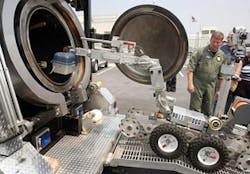ATLANTA (AP) -- The latest technology to guard against bioterrorism is now available at Hartsfield-Jackson Atlanta International Airport, officials said.
The new containment technology, an explosive response truck and a robot to retrieve suspicious devices were shown off during a news conference Thursday. Airport manager Ben DeCosta called it ''a major milestone'' in providing safety and security for the traveling public that goes through the nation's busiest airport.
''We are prepared to handle any kind of explosive device,'' added Sgt. Robert Bailey, a bomb technician with the Airport Police K-9/Explosive Ordinance Disposal Unit. ''The airtight containment vessel can seal up any biochemical agent.''
It is the second truck and containment vessel in the unit's arsenal, but the older one wasn't capable of handling biochemical material.
Bailey said now if an explosive device is attached ''to something bad and ugly, we could render that device safe. Now we are fully equipped to do it.''
If a biochemical agent is destroyed in the vessel, Bailey said a sample can be retrieved and sent to the FBI lab to determine exactly what the material is.
Other equipment on board the truck includes protective suits for the technicians in the event of a biochemical threat and a ''bread box'' - the X-ray machine that digitally analyzes contained devices and sends a report to a laptop computer.
A technician sits in the truck and directs the movement of the robot - one the unit nicknamed ''Bull Dog.''
''We are Bulldog fans,'' Bailey said, referring to the University of Georgia athletic teams.
The Department of Aviation purchased the 25,500-pound truck for $165,000 with a $200,000 grant from the Department of Homeland Security that also was used to purchase the containment vessel and robot.
DeCosta said there were no federal mandates to upgrade the equipment available.
''This is simply our commitment to preventive security measures, and the safety of our passengers,'' he said.
Hartsfield-Jackson has seen 27 million passengers from January to April of this year, and is on track to serve 88 million passengers by the end of the year.





